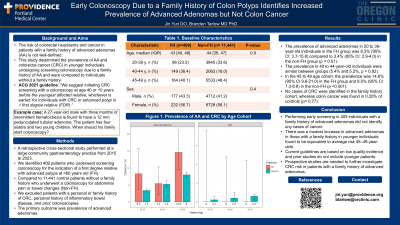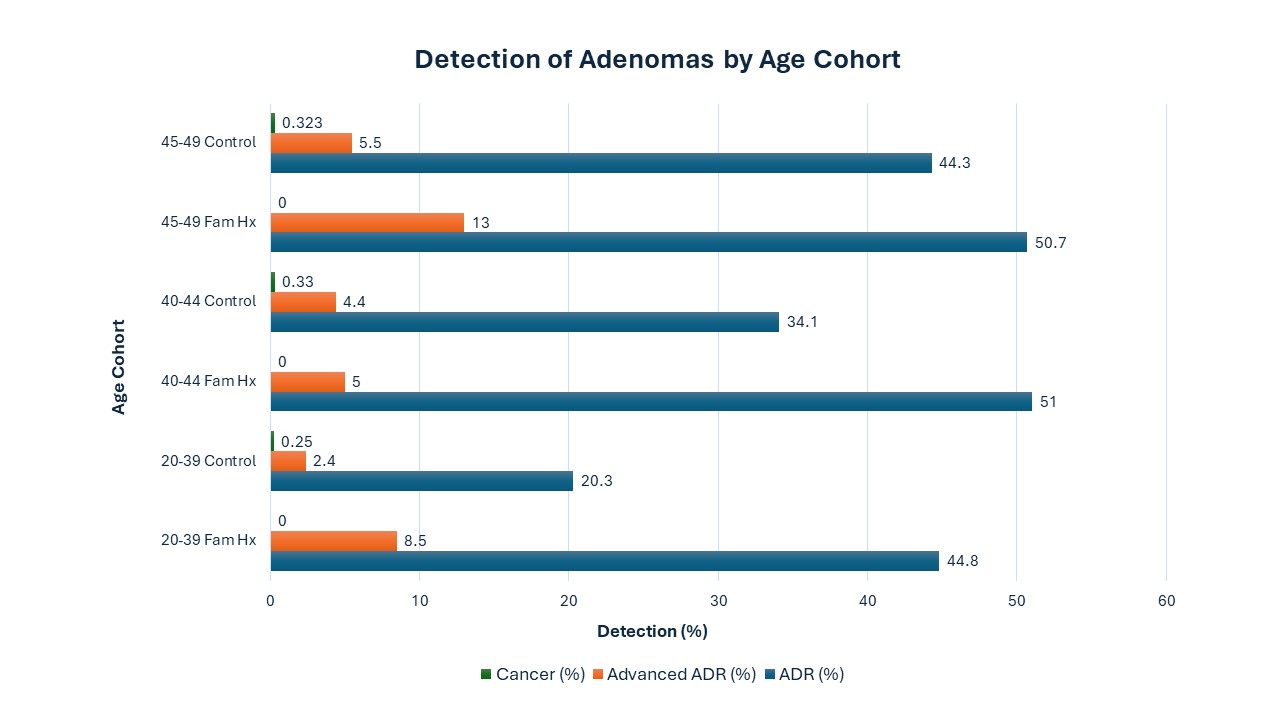Tuesday Poster Session
Category: Colorectal Cancer Prevention
P3838 - Early Colonoscopy Due to a Family History of Colon Polyps Identifies Increased Prevalence of Advanced Adenomas but Not Colon Cancer
Tuesday, October 29, 2024
10:30 AM - 4:00 PM ET
Location: Exhibit Hall E

Has Audio

Jin Yun, DO
Providence Portland Medical Center
Portland, OR
Presenting Author(s)
Jin Yun, DO1, Branden Tarlow, MD2
1Providence Portland Medical Center, Portland, OR; 2The Oregon Clinic, Portland, OR
Introduction: Colorectal cancer (CRC) screening guidelines recommend individuals with a family history of advanced adenomas (AA) initiate colon cancer screening at 40 years old or 10 years before the age their first degree relative (FDR) had an AA. The evidence supporting this recommendation is limited. The aim of our study is to determine the incidence of advanced adenomas in younger individuals undergoing colonoscopy due to a family history of advanced polyps at a large community practice.
Methods: We performed a retrospective cross-sectional study to identify patients undergoing colonoscopy due to a family history of colon polyps in a large community gastroenterology practice with a robust quality assurance program. 479 patients who underwent colonoscopy due to a FDR with AA (“exposed”) were identified. The control population (“unexposed”) consisted of 16,672 patients who underwent a colonoscopy for abdominal pain or bowel changes. Individuals with a personal history of CRC or known colorectal syndromes were excluded. Patients were divided into three separate age cohorts of 20-39, 40-45, and 45-49 years old for analysis.
Results: The incidence of advanced adenomas in 20 to 39-year-old individuals in the exposed group was 8.5% compared to 2.4% in the unexposed group in the same age cohort (p = 0.0001). The incidence in 40 to 45-year-old individuals were similar between groups (5% and 4.4%, p = 0.714). In the 45-49 age cohort, the incidence was 13% in the exposed group and 5.5% in the unexposed (p < 0.0001). No cases of CRC were identified in the family history cohort, whereas colon cancer was found in 0.36% of controls (p = 0.4586).
Discussion: In this retrospective study, a family history of colon polyps was associated with a small increased incidence of advanced adenoma detection in patients ages 18-39 and 45-49 but not 40-45. National guidelines recommending early colonoscopy are based on indirect evidence from limited studies. More data is needed to justify recommendations to initiate colonoscopy prior to age 40 based on a family history of polyps alone.

Disclosures:
Jin Yun, DO1, Branden Tarlow, MD2. P3838 - Early Colonoscopy Due to a Family History of Colon Polyps Identifies Increased Prevalence of Advanced Adenomas but Not Colon Cancer, ACG 2024 Annual Scientific Meeting Abstracts. Philadelphia, PA: American College of Gastroenterology.
1Providence Portland Medical Center, Portland, OR; 2The Oregon Clinic, Portland, OR
Introduction: Colorectal cancer (CRC) screening guidelines recommend individuals with a family history of advanced adenomas (AA) initiate colon cancer screening at 40 years old or 10 years before the age their first degree relative (FDR) had an AA. The evidence supporting this recommendation is limited. The aim of our study is to determine the incidence of advanced adenomas in younger individuals undergoing colonoscopy due to a family history of advanced polyps at a large community practice.
Methods: We performed a retrospective cross-sectional study to identify patients undergoing colonoscopy due to a family history of colon polyps in a large community gastroenterology practice with a robust quality assurance program. 479 patients who underwent colonoscopy due to a FDR with AA (“exposed”) were identified. The control population (“unexposed”) consisted of 16,672 patients who underwent a colonoscopy for abdominal pain or bowel changes. Individuals with a personal history of CRC or known colorectal syndromes were excluded. Patients were divided into three separate age cohorts of 20-39, 40-45, and 45-49 years old for analysis.
Results: The incidence of advanced adenomas in 20 to 39-year-old individuals in the exposed group was 8.5% compared to 2.4% in the unexposed group in the same age cohort (p = 0.0001). The incidence in 40 to 45-year-old individuals were similar between groups (5% and 4.4%, p = 0.714). In the 45-49 age cohort, the incidence was 13% in the exposed group and 5.5% in the unexposed (p < 0.0001). No cases of CRC were identified in the family history cohort, whereas colon cancer was found in 0.36% of controls (p = 0.4586).
Discussion: In this retrospective study, a family history of colon polyps was associated with a small increased incidence of advanced adenoma detection in patients ages 18-39 and 45-49 but not 40-45. National guidelines recommending early colonoscopy are based on indirect evidence from limited studies. More data is needed to justify recommendations to initiate colonoscopy prior to age 40 based on a family history of polyps alone.

Figure: Detection of Adenomas and Cancer by Age Cohort
Disclosures:
Jin Yun indicated no relevant financial relationships.
Branden Tarlow indicated no relevant financial relationships.
Jin Yun, DO1, Branden Tarlow, MD2. P3838 - Early Colonoscopy Due to a Family History of Colon Polyps Identifies Increased Prevalence of Advanced Adenomas but Not Colon Cancer, ACG 2024 Annual Scientific Meeting Abstracts. Philadelphia, PA: American College of Gastroenterology.
